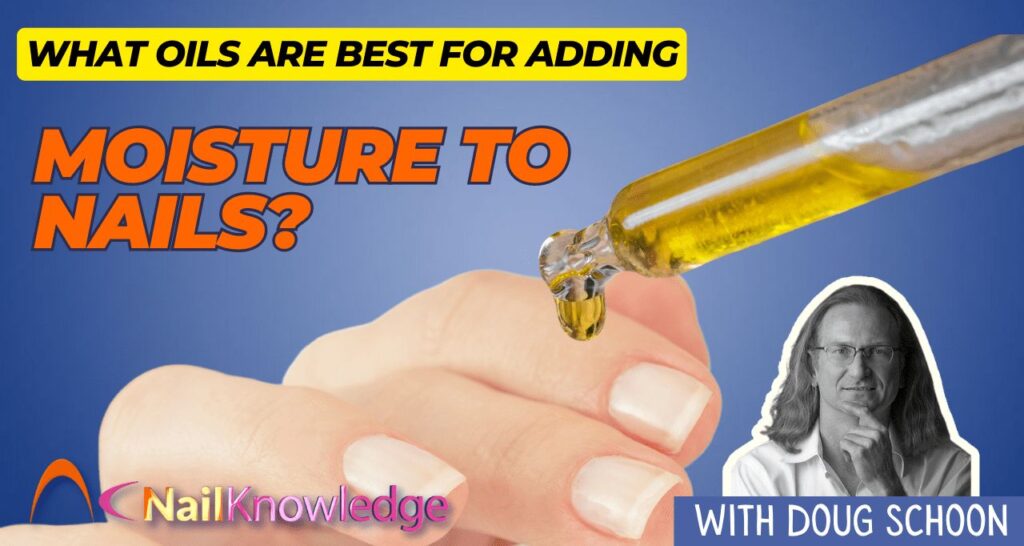Además, ¿son mejores los distintos aceites para el cabello o la piel?
Moisturizers are misunderstood. Contrary to what some may believe, oils can’t add any moisture to nails, skin or hair, but they can prevent “dryness”, so this causes some confusion.
El papel de la hidratación y la concentración de agua
When moisturizing is added, that increases “water” concentration inside nails, skin or hair. As you probably already know, water and oil don’t mix.
Naturaleza anhidra de los aceites cosméticos y emulsionantes
The water content of any cosmetic oil is nearly zero. They are considered “anhydrous” or “without water”. Oils and water can exist together in a cosmetic lotion or cream, but only if they are mixed with a special type of ingredient called an “emulsifier”. Emulsifiers are used to create many types of oil and water blends. Many foods, such as salad dressings, mayonnaise and ice cream are all made possible by emulsifiers and without them, these ingredients would quickly separate.
Contenido de humedad y cremas/lociones
Las cremas y lociones pueden aumentar el contenido de humedad de las uñas, la piel o el cabello porque contienen cantidades significativas de agua como ingrediente. Los aceites por sí solos también pueden aumentar la humedad content of nails and skin, but they do this in a different way than many understand. Oils coat the nails and skin with a thin film that forms a moisture resistant barrier.
Aceites y su impacto en el contenido de humedad
Some oils can penetrate and will create a barrier in the upper layers of the skin. Underneath this barrier, moisture can build up, thus raising the water content of nails or skin, but not for hair. Why? A steady supply of water travels from the nail bed to the nail plate surface, just as it does from the dermis to the skin’s outer surface.
Migración del agua y TEWL
This water migration is slowed down by oils. Water migration through the epidermis is called “trans-epidermal water loss” or TEWL. Cosmetic scientists use special instruments to measure the TEWL to determine the effectiveness of skin lotions, creams and oils. Lower water loss (less water escaping from the skin) means a product is a more effective moisturizer.
Oils’ Effects on Nails, Skin, and Hair
This type of water migration doesn’t occur in a shaft of hair, so oils can’t moisturize the hair. Some oils provide additional benefits by increasing the flexibility in nails, skin or hair. As I explained in a previous question, nail oils add lubrication which allows the various layers to slide across each other, increasing flexibility. Oils also soften each of these to make their surfaces less hard. Some don’t penetrate at all, and remain on top of the skin. Those that sit on top of the skin are called “occlusive agents”.
Agentes oclusivos y retención de la humedad
That term may sound like something out of a spy thriller, but the word “occlude” simply means “to block” or “obstruct”. Mineral oil is an “occlusive agent” which means it doesn’t penetrate; instead, it will sit on the skin to create a barrier that slows or blocks moisture evaporation.
Los aceites de silicona también pueden ser agentes oclusivos.
Aumento de la hidratación y del volumen de la piel
The same type of moisture build-up would occur if you wrapped the skin in plastic wraps that keep foods fresh in the refrigerator. Occluding the skin causes moisture build-up, but we wouldn’t think of these plastic wraps as a skin moisturizer, even though they increase the level of moisture in the skin.
El aumento del contenido de agua también puede funcionar para suavizar y mejorar la flexibilidad de la piel y también puede causar el relleno. Por supuesto, lo mismo ocurre en la lámina ungueal, pero en menor grado, y lo contrario también sucede.
Aceites y bloqueo Penetración excesiva de agua
Los aceites también pueden bloquear la penetración de cantidades excesivas de agua del exterior en las uñas, el pelo o la piel y evitar que se saturen en exceso de moléculas de agua.
Conclusión
Comprender el papel de los aceites en la hidratación es crucial para mantener sanas las uñas, la piel y el cabello. Aunque los aceites por sí mismos no pueden añadir hidratación, desempeñan un papel importante en la prevención de la sequedad al crear una barrera protectora. Los aceites difieren en su capacidad para penetrar y crear barreras, y algunos ofrecen beneficios adicionales como una mayor flexibilidad.
It’s important to note that water and oil do not mix, and the water content of cosmetic oils is minimal. Creams and lotions, on the other hand, contain significant amounts of water, making them effective at increasing moisture content.
Furthermore, the concept of occlusive agents, such as mineral oil and silicone oils, should be understood. These agents form a barrier on the skin’s surface, slowing down moisture evaporation and enhancing softness and plumping effects. However, they should not be mistaken for traditional moisturizers.
Si conocemos las diferencias entre aceites, cremas y agentes oclusivos, podremos elegir con conocimiento de causa los mejores productos para la salud de las uñas, la piel y el cabello. Recuerda tener en cuenta las propiedades únicas de cada uno y elegir en consecuencia para mantener unos niveles óptimos de hidratación y bienestar general.
Preguntas frecuentes
- ¿Pueden los aceites aportar hidratación a las uñas, la piel o el cabello?
No, los aceites no pueden aportar hidratación a las uñas, la piel o el cabello. Sin embargo, pueden prevenir la sequedad formando una barrera que retiene la humedad. - ¿Pueden los distintos aceites tener efectos diferentes sobre la piel en comparación con el cabello?
Sí, los distintos aceites pueden tener efectos diferentes sobre la piel en comparación con el cabello. Mientras que los aceites pueden aumentar el contenido de humedad y proporcionar beneficios para las uñas y la piel, no tienen el mismo efecto hidratante sobre el cabello. - ¿Qué son los agentes oclusivos y cómo influyen en la retención de la humedad?
Occlusive agents are substances that create a barrier on the skin’s surface, preventing moisture evaporation. Examples include mineral oil and silicone oils. They can help retain moisture and improve skin flexibility, but they should not be confused with traditional skin moisturizers.


